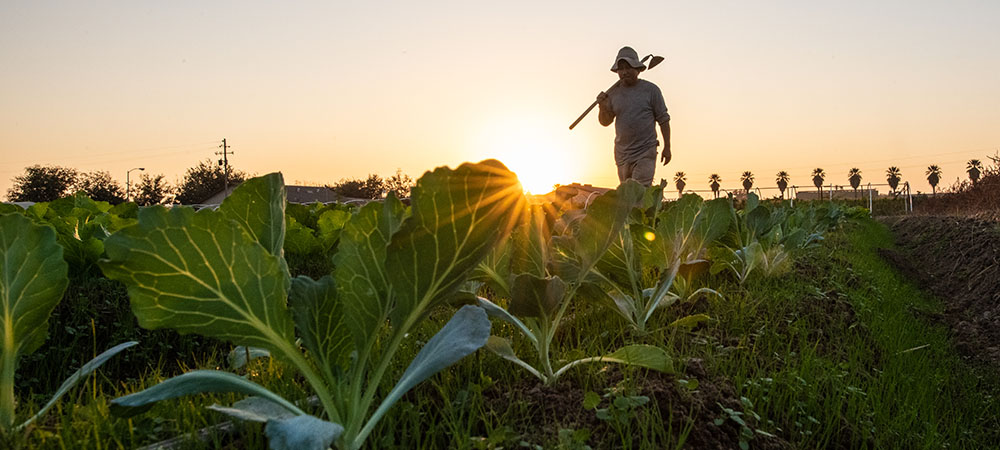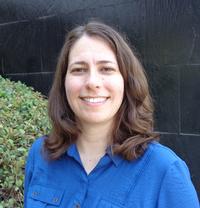
Hmong farmer in Sanger, California (Photo: USDA/Lance Cheung)
California Forward is committed to advancing policy intersections that create a more inclusive and sustainable California where all people can prosper. To move this forward, we must reimagine a state where we address the racial and geographic inequities that have been exacerbated by a public health and economic crisis, and we must answer the call to dismantle structural racism. The Voices of Shared Prosperity series amplifies the stories of Californians who are committing their time and talent to solutions that embrace equity, environmental sustainability, and economic opportunity.
It’s no secret that agriculture is one of California’s largest industries. In 2019 (the latest reported year) the state’s nearly 70,000 farms and ranches made more than $50 billion. But California’s farms come in all sizes and smaller farms often need assistance and guidance to compete in the marketplace.
University of California Cooperative Extension provides Small Farms Advisors across the state to help small farmers thrive economically and sustainably. They assist small farmers in the production of small acreage crops, assist with regulatory compliance and work with policymakers on small farming regulations when California takes a one-size-fits-all approach to agriculture regulations. Four advisors are active in Fresno/Tulare Counties, San Benito/Santa Clara/Santa Cruz Counties, Sacramento/Yolo/Solano Counties, and San Diego County.

Ruth Dahlquist-Willard is the Small Farms Advisor for Fresno and Tulare Counties. She works with a team, which includes bilingual community educators, to help hundreds of the region’s small farmers solve production issues and find niche markets. They also help with regulatory and compliance paperwork because many small farmers don’t have the staff or resources to complete these tasks.
“We don’t ask anybody their income, but we have a sense of who our clients are, based on their crops and their marketing strategies,” said Dahlquist-Willard. “Usually, they’re trying to access farmers’ markets or restaurants or direct connections with grocery stores or agrotourism.”
She explained, “We also focus on serving farmers of color and people who have not traditionally been served well by previous extension programs.” Many of the farmers her team works with are growing different crops for different ethnic groups. “In Fresno, we have a Southeast Asian farming community. There’s a large population of refugee and immigrant farmers that have similar farms that grow mixed vegetables, some traditional and culturally-important Asian vegetables, as well as mainstream vegetables for the U.S. consumers.”
| Only a little over half of Fresno County residents live in areas without concentrated poverty with less than twenty percent of residents below the Federal Poverty line. By contrast, only 81% of Californians across the state live in such prosperous neighborhoods. Learn more about the Prosperous Neighborhood indicator and the broader California Dream Index here. |
|---|
The Small Farm Advisors are working to increase outreach to different communities. “Right now, we are receiving a boost to our work through additional funding from the California Legislature to hire some new small farms advisors and community educators,” she said.
She and her team worked with small farmers during the COVID-19 pandemic shutdown, which affected sales as farmers’ markets and restaurants closed. She said some farmers started using online sales to deliver their produce directly to customers, a trend that may continue.
But as the California recovers from the pandemic, another large challenge looms – the drought. “We have a changing climate, and we have to have different strategies that will probably include different crops and different amounts of water and different markets for the crops,” said Dahlquist-Willard.
Though not from a farming family, Dahlquist-Willard grew up around agriculture in Kingsburg, located in Fresno County. “I got interested in agriculture because I really like studying ecology and biology and I really want to do something that makes a difference,” she explained. “It’s sort of an overlap of concerns about people, concerns about the environment and concerns about economics – agriculture really integrates a lot of different parts of society and that’s very fulfilling to me to work in that space.”
Through her work, she is able to not only assist small farms, but also promote their importance to the state’s agricultural industry. “One of the things that is really a value of small farms in California is the diversity and it’s both diversity of people and different cultures and languages and backgrounds and experiences and crops. Diversity is good for resilience.”

